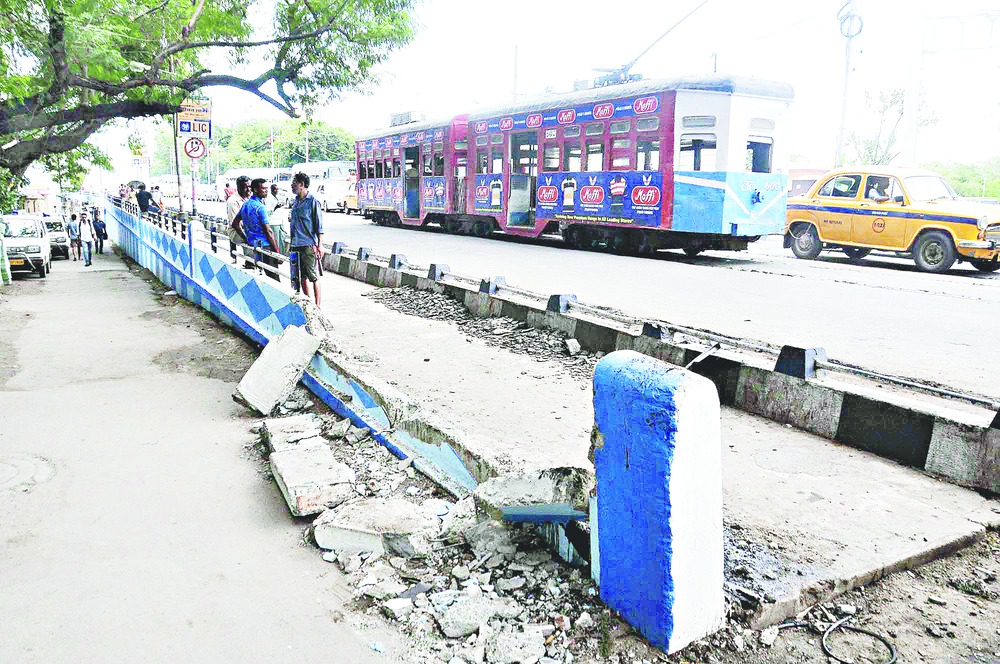
More than 55 per cent of the two main categories of vehicles - chartered buses and pool cars - that ferry children to and from schools in and around Calcutta do not have the mandatory documents, including permits, but continue to do business without any accountability.
While pool cars are clearly far more in number, the sheer number of school buses that continue to ply without valid papers have nudged the police and the transport department to gear up to launch a "crackdown" within the next few weeks.
There aren't any official figures, but of the estimated 3,550 pool cars plying across the city and its fringes, only about 1,200 have valid permits to carry schoolchildren, according to transport department officials.
Of the 2,800-odd buses that ferry schoolchildren, around 1,500 have valid permits, according to transport department officials.
Within Calcutta, about 360 buses ferry schoolchildren, but only 70 have permits to do, said an official at the public vehicles department, Beltala.
Guidelines laid down by the Supreme Court for school buses in the late 1990s make it mandatory for any such vehicle to have "School Bus" prominently written on its back and front - "On School Duty" in case of a hired bus - besides being equipped with a first-aid box and a fire extinguisher each. The driver is required to have a minimum of five years' experience. The bus must be painted golden-yellow and a 150mm wide school identification band in golden brown. The school's name and telephone number should also be displayed on the body of the bus.
The vehicle must be registered as a "contract carriage", possess a valid permit that is to be renewed every five years and be subjected to a fitness check every year. There should be an emergency exit on the rear right-hand side of the bus. The rear must be fitted with a speed governor.
The school bus that rammed into a pillar of the Parama flyover on June 24 - the driver died and 11 students of Loreto House were injured - had not undergone a roadworthiness test since 2014 and was running on resoled tyres. The school bus that hit the pedestrian railing on the Belgachhia Road bridge on Friday had cleared the fitness test six months ago despite being well past the high court-specified age limit for commercial vehicles, which is 15 years. The vehicle, registered in 1998, was also in poor shape.
"In most cases, buses either do not possess a valid fitness certificate, a permit or even tax token," said a senior traffic police officer. "A chartered school bus must have a document to prove that the owner has a contract with a particular educational institution. All details of the contract should be provided."
In the business of ferrying school kids, it is easier to run pool cars than buses.
By the rule book, any vehicle can be converted into a pool car, provided it doesn't have a "soft-top cover" like a jeep or an autorickshaw and follows the norms laid down for ferrying schoolchildren. A car that has been on the road for some time needs to be BS-III complaint and not more than 10 years old while a new vehicle must be BS-IV complaint.
"The vehicle owner has to first apply for a commercial registration, then for an offer letter from the government. The fitness test comes next. A vehicle that has been cleared can become a pool car after the owner pays the requisite fee for a permit," said a senior official of the transport department. "A vehicle ferrying schoolchildren for commercial gain without a permit is illegal."
In the city as well as its adjoining areas, school buses and pool cars rarely come under the scanner because there aren't enough motor vehicle inspectors to do the job. The few who are on the road remain mostly engaged in checking overloaded trucks. The police, who are empowered to run a check, say traffic management and other duties leave them with little time to intercept vehicles ferrying schoolchildren to check if they are legal.










